Hola America Celebrates 20 Years Serving The Quad-Cities
 Saturday In The Arts is a weekly feature covering an impactful trend, personality, organization or overarching theme in the Quad-Cities arts and entertainment community.
Saturday In The Arts is a weekly feature covering an impactful trend, personality, organization or overarching theme in the Quad-Cities arts and entertainment community.
As the Quad-Cities and nationwide Hispanic population has exploded since 2000, Hola America News this month is celebrating 20 years as the area’s influential bilingual newspaper and a positive force for information, cultural pride and public service throughout the region.
“The 20th anniversary of Hola America News is a testament to its hard work and longstanding importance in the media for both Latinos and the community at large,” Nick Salazar, state director for the Iowa chapter of the League of United Latin American Citizens (LULAC), said recently. Hola published its first issue Aug. 29, 2000.

The bilingual newspaper printed its first issue on Aug. 29, 2000.
“Throughout the years, the young Latino population has been quickly moving away from print media to digital media and away from Spanish media to bilingual media,” he said. “Hola America has shown its resiliency throughout the years by making these adjustments accordingly and while most importantly maintaining its printed media in Spanish to keep our parents and grandparents informed in the Quad-Cities and across Iowa.”
“While mainstream, regional, and local media usually portray a narrow view of Latinos on the surface, Hola America, as a news publication by and for Latinos, has covered a broader range of issues, activities, and viewpoints for its audiences providing a complete picture of the Latino community that otherwise would have been ignored or misrepresented,” Salazar said.
“Hola America being able to cover a deeper range of issues in the Latino community played an instrumental role in the activism and growth of LULAC in Iowa throughout the years,” he added. “Hola America, in a place of servitude, has helped LULAC elevate the stories and issues from the Latino community that traditional media could not cover.”
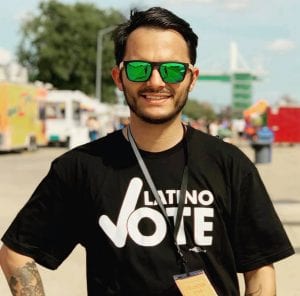
Nick Salazaar, the Iowa state director for LULAC, in Davenport.
Juanita Zertuche, president of LULAC Council 5285 (representing Rock Island County), said from the very beginning it formed about eight years ago, “Hola was part of helping us with anything we needed.”
“Getting our name out in the community, they were always very supportive,” she said, noting Hola had been members of the long established LULAC Council 10 on the Iowa side. “They knew how important it was to find connections for the local community; we are very grateful.”
Hola has raised awareness of local scholarship funds and programs impacting the growing Hispanic community (while LULAC scholarships are available to any students), Zertuche said.
“They were key to make sure everyone in the community is informed, to keep engaged in what’s going on in our communities,” she said. The paper also “was instrumental for the East Moline Parade and Fiesta. Hola supported this event and donated many hours to showcase and promote this event.”
Reflecting the community
Hola president Tar Macias – a 47-year-old Mexican-American who moved to Moline in 1987 – said his mission was inspired by Jerry Taylor, former publisher of The Dispatch and Rock Island Argus, who told him: “A newspaper is a reflection of the community it serves.”
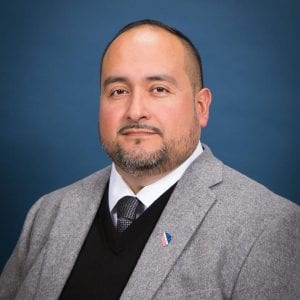
Tar Macias
Starting in 2005, The Dispatch printed Hola for many years; it’s currently printed in Marshalltown, Iowa.
Its mission statement is: “Hola America will always do its best to properly reflect the Latino community fairly and with dignity.” Macias said when the local or national media focuses on Latino stories, “it’s mainly when we do something wrong.”
“For every negative news article about a Latino committing a crime, there are literally thousands of positive stories of Latinos doing something good and contributing to our communities,” he said. “But those stories seldom get told. That is what Hola America has been trying to do for many years.”
Macias’ mother’s side of the family has lived in Moline for seven generations. Language was his biggest challenge growing up. “I did not know any English and I had to take all my classes in English at Moline High School,” he said, graduating in 1990, before studying at Black Hawk College.
He worked for Voces Weekly, a bilingual newspaper, for about a year and after it went out of business, he saw a void to fill in the area.
Hola took shape to cover a steadily growing, active Latino world, locally and nationally. In America, the Hispanic population has skyrocketed from 35.7 million in 2000 to an estimated 60.6 million in 2019. Nearly one in five residents of Moline and East Moline are Latinx, with growth in Scott County 42 percent from 2000-2010, and 28 percent since 2010.
“Now the fastest growing group of Latino immigrants that we see coming to the QC are not necessarily coming from Latin America; they are coming from big cities like Chicago or L.A., looking for a more economic and safer place to raise their families,” Macias said. “They are mostly U.S.-born Latinos.”
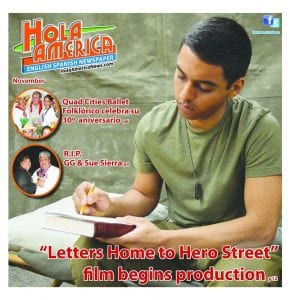
“Letters Home From Hero Street” was a cover story for Hola America.
He and his wife Erika are the only official employees of Hola, but they have about 10 freelancers and others who work with them on a regular basis. Before this past April and Covid-19, they published and distributed the paper for free twice a month – 10,000 copies of Hola America News and Hola Iowa (started in 2014). Since April, they combined the publications and print once a month.
“With Covid-19, we are reevaluating how we are going to approach the print distribution,” Macias said. “Some locations are closed for now – like restaurants and offices — but some locations like El Mexicano food market in Moline, 1,200 newspapers go there with every issue, just in that place alone.”
“Many newspapers are going online only, but I’m afraid we have a big audience that still prefers the hard copy of the newsprint,” he said. “On our social media platform, we are reaching around 250,000 people every month with an engagement of 100,000 people every 28 days in a consistent basis for the last few years.
Its website, HolaAmericaNews.com, reaches about 20,000 people per week.
“I think our role is to try to disperse the misinformation out there about the Latino community,” Macias said. “These are hard times, but we have to take a stand on our values.”
“On social media, people have said we are becoming too political, but everything is political now,” he said. “Even wearing a mask has become a political stance — how did we get here?”
Macias added that he is inspired by the humanitarian Elie Wiesel, who said: “And that is why I swore never to be silent whenever wherever human beings endure suffering and humiliation. We must take sides. Neutrality helps the oppressor, never the victim. Silence encourages the tormentor, never the tormented.”
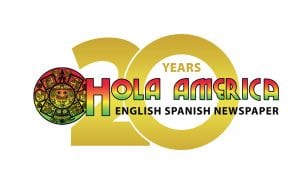
Hola is celebrating its 20th anniversary this month.
“On the newspaper, we are more objective but our social media platform, we are more vocal,” Macias said. “Sometimes people do know how to separate the different media platforms.”
After creating Hola Iowa, based in Des Moines, the couple created a strategic plan that turned Hola America into what they call a “community service,” connecting with businesses, nonprofits, and government agencies that want a meaningful relationship with Latino Americans, according to a dsm magazine piece this past March.
Clients have included Iowa State University Extension and Outreach, Des Moines Community Playhouse and Des Moines Metro Credit Union. Tar called Erika the guiding light of Hola America, but she told the magazine she has a different title – “I’m the boss…I take care of everything.”
Joe Gonzalez, a retired Des Moines police officer and organizer of the Latino Heritage Festival in Des Moines, worked with the Maciases for years. “Their passion and energy is a great example of how we should all be involved to make our community a better place,” he said.
Tar and Erika relocated to Des Moines in 2018 to help Hola Iowa become self-sustainable. “The QC is my home; I did not sell my house there but once our youngest daughter decides where she will be going to college next year, we will then decide where to stay or relocate,” he said. “Before Covid, we were traveling back almost every week.”
Hola is distributed throughout Iowa, from Council Bluffs to Davenport, and in the top 10 market areas for Latinos in Iowa.
Highlighting positive stories
“Their content is so family- and community-minded, also educational,” said Maria Ontiveros, president of Mercado on Fifth in Moline. “The fact they’ve been highlighting positive stories in the Latinx community has helped the community thrive. The bilingual resources on immigration, highlighting the community events has helped the Latinx community thrive in the Quad-Cities. Journalism is a tough field to be in and they’ve hung in there for the past 20 years.
“That’s because Erika and Tar are so dedicated to this community,” she said. “We’re lucky to have them.”
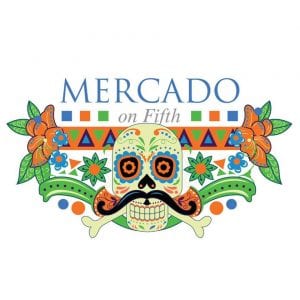
Moline’s Mercado on Fifth is among the nonprofits supported by Hola.
“They’ve definitely helped to promote Mercado on Fifth,” Ontiveros said. “I don’t know where we’d be without the photos they’ve taken. They’ve helped us to look more professional and spread the word to the whole Quad-Cities. They’re at every community event, it’s just awesome. They’re kind of the glue – and so friendly.”
“Hola America has been and continues to be a pivotal staple in the Illinois and Iowa Quad-Cities,” said Ray Terronez, Jr., director of Quad Cities Ballet Folklorico.
“Through their consistent hard work, bridges were built to reach further audiences which created many more opportunities for non-profit organizations like the Quad Cities Ballet Folklorico,” he said. “It is quite amazing how they have created a stronger sense of unity by advocating for the Latino culture, but at the same time promoting other diverse cultures.
“Without doubt, Hola America is the reason why so many cultural events are successful due to their exceptional use of media communications and their relentless motivation to be a supportive voice,” Terronez said. “We at Quad Cities Ballet Folklorico are absolutely thankful to the many years of support from Hola America and congratulate them on their 20th.”
One of the biggest impacts Hola America has had on the community is hosting visits by the Mexican Consulate based out of Chicago, to the Quad-Cities, Macias said.
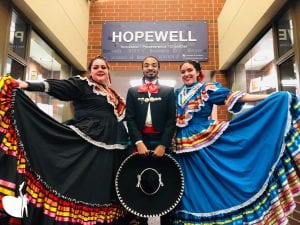
Ballet Folklorico is one of many cultural groups supported by Hola.
“These visits have helped literally thousands of Mexican residents of the Quad-Cities and surrounding areas get their passports and matricula cards,” he said, noting the cards are needed for a Mexican national to open a bank account.
Hola America has organized their visits every year, sometimes twice a year. Before the consulate visits to the Q-C, people would have to drive to Chicago and spend all day at the consulate office to get their passport, to travel back and forth to Mexico. The visits to the Q-C save people money and days off work by allowing them to apply for their passport at these events.
The impact is in the upwards of 15,000 families served in the last 20 years, Macias said.
Hola was instrumental in assisting LULAC Iowa with their expansion of new councils throughout the state, including Iowa City, Muscatine, Cedar Rapids, Marshalltown and Mount Pleasant, he said.
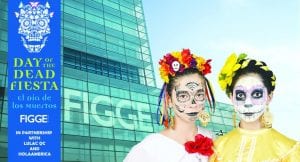
The Figge’s Day of the Dead Fiesta is a popular fall event.
“When we started getting involved in this initiative was with the newly formed Iowa City council — only the fifth council at that time.” Macias said, noting LULAC Iowa now has 20 councils throughout the state.
Among other programs and events Hola has been closely involved with are:
- Day of the Dead Fiesta at the Figge Art Museum, which Macias suggested when the building opened in 2005. After handing off the event to different community organizations, Hola America was asked again in 2016 to come back and partner with LULAC and the Figge to help organize it, which draws about 4,000 people a year to the one-day Family Fiesta.
“Our partnership has just become stronger, with endless support from Hola America – both for the biannual exhibitions and for the family fiesta,” said Heather Aaronson, Figge education programs coordinator. “For instance, Hola America does all the translations to Spanish so that the labels and signage are available to the community in Spanish.
“Our solid partnership with Hola America emerged around 2014, as Casa Guanajuato went through an organizational struggle, Hola America was there to help rebuild and reimagine our event, along with major support from LULAC (including Ballet Folklorico and the Glenview Mariachi),” she said by e-mail.
“I can’t tell you enough about the amazing conversations I have had over the years as people discover Day of the Dead for the first time, or uncover a lost family tradition,” Aaronson said. “It has definitely become a beloved celebration in the QC.”

The May 1, 2006 March for Immigration Reform crossed the Centennial Bridge.
“I feel that Hola America is deeply engrained into our Quad-City community and are ever supportive of the Hispanic population – through the arts, culture, politics, supporting businesses, endless partnerships, wonderful ideas, a can-do attitude, and all with an amazing amount of positivity and goodwill,” she said. “It has been more than my pleasure to work with Tar and Erika over the years, and I congratulate my friends on 20 years as Hola America.”
- March for Immigration Reform May 1, 2006, the biggest march ever in the QC for immigration reform, with 3,000 people crossing the Centennial Bridge. “What made this March amazing was that it was organized in a short time and by a handful of young people who had never organized something of this magnitude,” Macias said.
“It was a small group of us that in my dining room we held the meetings trying to figure out how we were going to organize the march. Part of
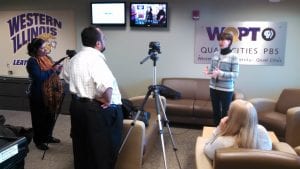
Erika and Tar Macias, left, filming Lora Adams at WQPT in Moline.
the group were high school kids, but what they lacked in experience they made up in passion,” he said.
- Project Vibrant Neighborhoods by WQPT-TV, led by Macias over 18 months to offer people in Moline’s Floreciente area a voice to showcase their pride in their place of residence and an opportunity to share what this neighborhood means to them.
“Now a heavily Hispanic neighborhood, Floreciente (which means ‘blooming’ in Spanish) is still a gateway for many people from different backgrounds setting roots in the Quad-Cities, and it’s one of the most culturally rich neighborhoods in the area,” Macias said. Hola also produced a bilingual TV show from 2009-2015, the last few years airing on WQPT.
“Hola America has been a wonderful partner to our entire area,” said Lora Adams, WQPT director of marketing. “Yes, they are a Hispanic paper, but their reach is throughout the area and not only the Hispanic community. When we worked with Hola America and Tar, it was always as partners in reaching the entire Quad-Cities and sharing information important to everyone.”
In 2013, Hola partnered with host Natalie Zarowny of WHBF-TV, who featured the contributions of the Hispanic community on Hola’s WQPT show. The weekly “Hola America” had been airing for five years (in Spanish only) as paid programming on the Quad-Cities local CW channel at 9 a.m. Sundays, before airing on WQPT
Hola consistently covered the Moline-based documentary filmmakers in their planned 10-part series on Hero Street of Silvis, and the history of Mexican-Americans in the area. It began with the 2015 film “Letters Home From Hero Street.”
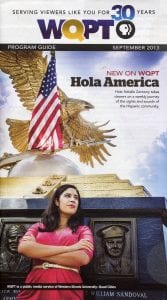
Natalie Zarowny at the Hero Street Memorial for the Hola series.
“Tammy and I are so grateful for Tar and Erika’s friendship and their support for our Hero Street film series,” director Kelly Rundle said. “Their coverage has been key to keeping the community informed about the project, and their encouragement has helped us get through some difficult times. We congratulate them on this important anniversary and milestone, and wish them the very best as they continue their important work.”
“It really is an amazing and influential news source that has empowered the appreciation and recognition of Hispanic arts, culture and history; unity, pride and progress,” producer Tammy Rundle said of Hola. “Tar and Erika had a vision and it has been realized by their hard work and dedication for two decades.”
Only a block and a half long, Second Street in Silvis lost six young men in World War II and two in the Korean War, more than any other street in America. Hero Street, as it is now known, has provided over 100 service members since Mexican-American immigrants settled there in 1929.
Hola America also hosted a holiday tradition for 14 years, teaming with Ascentra Credit Union for free Las Posadas celebrations at the Q-C Botanical Center in Rock Island. Children received goodie bags and the whole family enjoyed delicious tamales, sweet Mexican bread, hot chocolate, Mexican ponche and more.
The centuries-old Mexican tradition commemorates Mary and Joseph’s journey from Nazareth to Bethlehem in search of a warm place to stay the night. (Posadas is Spanish for “lodgings” or “accommodations.”)
For four years (through 2014), Hola organized a fashion show for aspiring Quinceañeras (like a sweet 16 celebration for 15-year-old girls). They also presented educational workshops for their parents on the process on how to prepare their kids for college.
With the long, unrelenting Covid crisis, Macias sees a vital role for Hola, among all media to be a trusted source for information.
“With the lack of information in Spanish, I think our role is crucial,” he said. “We had a special edition dedicated to that in May and have been writing articles about the issue as often as we can. We are still a small company and are very limited by our resources available.”
Hola may be small, but it’s been a mighty force for good, for 20 years and counting.









